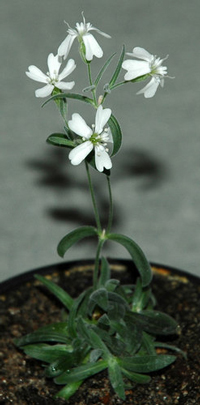Human Flower Project
Monday, February 20, 2012
A Flower from before the Pharoahs
A plant newly grown from an ancient fruit placenta may provide a key to evolution.
 A campion plant grown from fruit tissue found frozen along a Siberian Riverbank.
A campion plant grown from fruit tissue found frozen along a Siberian Riverbank.
Photo: via New York Times
Taking a giant leap back in time, Russian plant scientists claim to have succeeded in growing a plant from tissue 32,000 years old.
The New York Times reports on the research of Svetlana Yashina and David Gilichinsky (to be published tomorrow in The Proceedings of the U.S. National Academy of Sciences).
The scientists and their team found fruit of a narrow-leafed campion plant, buried by an ancient squirrel inside the bank of the Kolyma River in Siberia.
“Working with a burrow from the site called Duvanny Yar, the Russian researchers tried to germinate the campion seeds, but failed to do so. They then took cells from the placenta, the organ in the fruit that produces the seeds. They thawed out the cells and grew them in culture dishes into whole plants.
“Many plants can be propagated from a single adult cell, and this cloning procedure worked with three of the placentas, the Russian researchers report. They grew 36 ancient plants, which appeared identical to the present day narrow-leafed campion until they flowered, when they produced narrower and more splayed-out petals.”
 David A. Gilichinsky, one of the lead scientists who found and successfully grew the ancient campion plant.
David A. Gilichinsky, one of the lead scientists who found and successfully grew the ancient campion plant.
Photo: Cryosol Working Group
Sadly, Dr. Gilichinsky died of a heart attack Saturday.
But if DNA studies and radiocarbon dating confirm the discovery, the plants that he and his team have grown would be by far the oldest plants grown from ancient seed. The previous record holder was a date palm.




